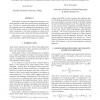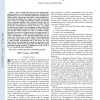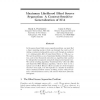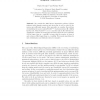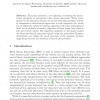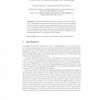112
click to vote
ICASSP
2011
IEEE
14 years 5 months ago
2011
IEEE
In this paper, we propose an adaptive time-frequency resolution approach for the single channel source separation problem. The aim is to improve the quality and intelligibility of...
168
click to vote
TIFS
2008
15 years 2 months ago
2008
Abstract-- It has recently been discovered that using pseudorandom sequences as carriers in spread-spectrum techniques for data-hiding is not at all a sufficient condition for ensu...
124
click to vote
NIPS
1996
15 years 3 months ago
1996
In the square linear blind source separation problem, one must nd a linear unmixing operator which can detangle the result xi(t) of mixing n unknown independent sources si(t) thro...
107
click to vote
ICA
2004
Springer
15 years 7 months ago
2004
Springer
We consider the Blind Source Separation problem of linear mixtures with singular matrices and show that it can be solved if the sources are sufficiently sparse. More generally, we ...
128
click to vote
ICA
2007
Springer
15 years 8 months ago
2007
Springer
Abstract. This paper presents a new algorithm for solving the permutation ambiguity in convolutive blind source separation. When transformed to the frequency domain, the source sep...
116
click to vote
ICIP
2008
IEEE
15 years 8 months ago
2008
IEEE
The goal of this paper is to investigate the impact of dictionary choosing for a total variation dictionary model. After theoretical analysis, we present the experiments in which ...
119
click to vote
ICANN
2009
Springer
15 years 8 months ago
2009
Springer
Abstract. We demonstrate that selective attention can improve learning. Considerably fewer samples are needed to learn a source separation problem when the inputs are pre-segmented...
